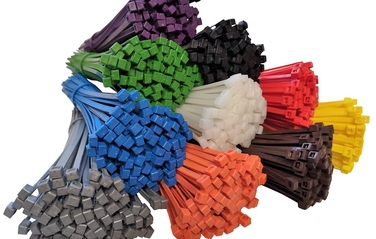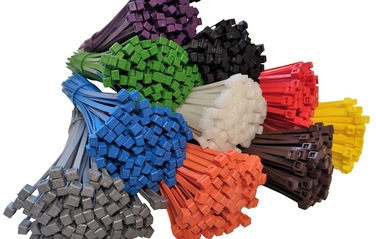What types of metal cable ties are there and what do you use them for? We look at how to use stainless steel cable ties and when you should choose which one.
You would be forgiven for thinking that it is just nylon 6/6 cable ties that are supplied in a host of lengths and strengths for different roles. In fact, their metal counterparts have a huge part to play in various applications across a wide spectrum of industries.
Many metal cable ties are manufactured from 304 stainless steel but at cableties-online, we use only the finest marine-grade 316 stainless steel; this is characterised by a 2-3% molybdenum content (a naturally occurring mineral) which renders it resistant to pitting and corrosion and gives it much better heat resistance. 316 stainless steel is also stronger than 304 stainless steel with tensile strengths of 89kg for cable ties 4.6mm wide and 160kg for ties that are 7.9mm.
This unparalleled tensile strength, coupled with a working temperature range between -80°C to +538°C, makes our stainless steel cable ties ideal for a variety of environments and situations. Their excellent resistance to corrosion, makes them the perfect choice to secure anything that will be exposed to extreme weather conditions, which is why stainless steel cable ties are often used in the off-shore industry and in outdoor applications.
Metal cable ties made from 316 stainless steel also offer better resistance to chlorides, acids and salt water than those made from 304 stainless steel and so are often used in the mining, aviation and petrochemical industries. In the automotive industry too, where cable ties are exposed to chemicals and heat, not to mention oil, grease and fuel, stainless steel cable ties are the ideal choice.
In addition to our range of stainless steel cable ties, cableties-online also supply coated stainless steel cable ties and metal detectable cable ties which contain a metal content. With a choice of an epoxy resin or a PVC coating, coated stainless steel ties offer the tensile strength of their non-coated cousin while providing protection for surfaces from scratches and damage. Coated stainless steel cable ties are also recommended for any situation where they will come into contact with galvanized steel, to avoid reactions. Metal detectable cable ties are used in any industry that are subject to safety laws and where there is a risk of contamination, including the pharmaceutical and food production industries.
What is the difference between stainless steel cables ties and nylon cable ties?
Unlike nylon cable ties which have a locking barb, stainless steel cable ties have a unique roller ball locking system. Durable and reliable, this locking system is suited for any heavy-duty applications where stainless steel cable ties are being used.
Where nylon cable ties are ridged on one side, stainless steel ties are completely smooth, front and back. This makes them harder to grip manually so while it is possible to tighten them by hand, we recommend the use of a cable tie installation tool, which will tighten and cut the tie in one move.
The conditions your cable ties face will determine which you should choose. If you are not sure whether stainless steel or nylon cable ties are suited to your next job, please call our friendly team who will be happy to advise you, on 01623 706241.








